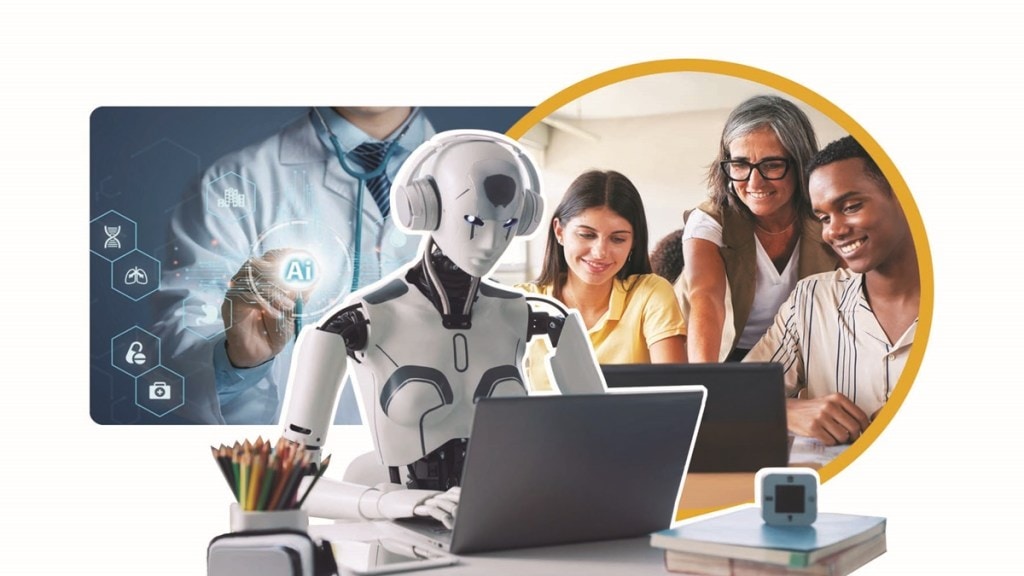By Sugandha Mukherjee
AI tool 4x more accurate than doctors
Microsoft says its latest medical AI tool outperforms doctors, four times higher than a group of experienced physicians. Designed to handle complex diagnostic puzzles, the system applies a step-by-step reasoning model to check symptoms, test results, and case histories to reach a diagnosis. The tests primarily rely on multiple-choice questions, which favour memorisation over deep understanding. Early research suggests it can outperform physicians on benchmark tests by up to 400%. While it’s not meant to replace doctors, Microsoft sees this as a major leap in clinical decision support. The model is still in testing, but its promise adds to the growing interest in AI-powered healthcare, particularly in low-resource settings and overburdened systems looking for smart diagnostic shortcuts.
Google attracts students
Google is opening its suite of AI tools to younger users. As part of a broader update to Google Classroom, the tech giant will now allow users under 18 to access over 30 Gemini-powered tools, including NotebookLM, an AI research assistant that helps summarise texts, generate questions, create study guides and podcast-style audio overviews. Teachers with a Google Workspace account will gain a dedicated Gemini tab to draft lesson plans, math problems, and even school emails. Google insists safety measures and age-specific controls are baked in. For now, the rollout suggests the classroom of the future may not just be digital, it may also be co-taught by bots.
Spotify’s hit AI-generated?
Spotify’s algorithm may have just found its match — made by another algorithm. The Velvet Sundown, a retro neo-psych/folk rock act, is gaining attention not just for its groovy, lo-fi sound but also because many believe it is entirely AI-generated. With over 9 lakh streams, the band has a growing fanbase despite having no verified identity or official media coverage. News reports and experts (Redditers) suggest the tracks were likely created using AI-generated vocals and instrumentation, possibly with help of generative music models. Even the following is likely to be bots.
Yet nowhere on its Spotify page is this disclosed. The band, meanwhile, in one of their many ‘official’ Instagram handles has refuted these claims and said “guessing most of these ‘journalists’ are actually just AI!”
UNESCO’s AI art class
What happens when centuries-old culture meets cutting-edge technology? UNESCO and South Korea’s Jeju province are hoping to find out. Their new initiative, the Jeju Culture Global AI Art Class, invites international youth to reinterpret traditional Jeju heritage using AI tools. From AI-generated brushwork to neural-network-infused folklore, the project blends technology with storytelling to deepen intercultural understanding. The pilot programme, launched in collaboration with local artists and educators, will feature a series of workshops, virtual exchanges, and a global art showcase. While AI is often portrayed as a disruptor in creative industries, this initiative might reframe it as a bridge, helping young people explore identity and heritage in hybrid forms.
Virtual apparel try
Your next stylist might just be an algorithm. Google’s experimental new app, Doppl, uses AI to let users preview how outfits will look on them without stepping into a dressing room. By uploading full-body photos, users can generate a personalised virtual model that showcases how garments drape, fit, twirl, and move. Still in its early stages, Doppl aims to improve online shopping by reducing guesswork and return rates. The app also raises questions about data privacy and body image, particularly as AI avatars become increasingly photorealistic.
Humanoid friend
AlphaBot 2, a humanoid from Chinese firm AI2 Robotics, isn’t just functional, it’s playful too. The robot, powered by advanced natural language and movement recognition, can interpret casual prompts like “want to play dice?” and act on them. In a demo held in Macao recently, it presses a button on a dice roller, watches the outcome, and even reacts with a thumbs up if its human opponent wins. Unlike purely machinist robots, AlphaBot 2 is designed for social engagement, blending responsiveness with situational awareness. While still in a research phase, the bot hints at a future where machines are not just tools but companions. Whether in eldercare, education, or hospitality sector, the ability to “read the room” may soon be as important as dexterity.








